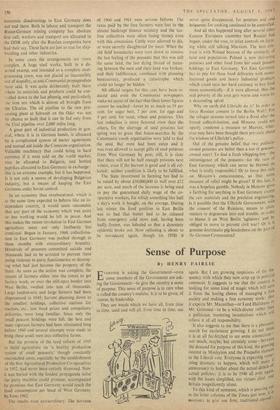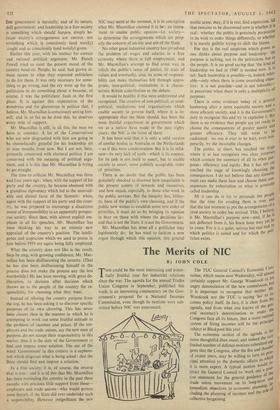Sense of Purpose
FAIRLIE By HENRY EVERYONE is asking the Government—even some members of the Government arc ask- ing the Government—to give the country a sense of purpose. This sense of purpose is to cure what is called the country's malaise. It is to be given, of course, by leadership.
They are words which we have all, from time to time, used and will all, from time to time; use again. But I am growing suspicious of the fre- quency with which they now crop up in Politie`i comment. It suggests to me that the country 's looking for some kind of magic which will save it from the boring chores of managing a free, society and making a free economy work : that it expects Mr. Macmillan—or Lord Hailsharn, or Mr. Grimond—to be a witch-doctor rather than, a politician, muttering incantations which will relieve it of all responsibility. It also suggests to me that there is a phrenetic search for excitement growing. I do not think it is at all far-fetched to see some connection-- not much, maybe, but certainly some—between the demand for purpose of this kind, the growiPg, interest in Mosleyism and the Poujadist element in the Liberal vote. Everyone is expecting solve; thing dramatic to happen, which will make unnecessary to bother about the actual details 01 actual policies: it is to be 1940 all over again,' with the issues simplified, our virtues clear, and Britain magnificently alone. To this kind of nonsense, which is pouring out in the letter columns of the Times just now, it is necessary to give one firm, traditional answer:
free government is normally, and of its nature, dull government; and leadership in a free society is something which should happen, simply be- cause society's arrangements are correct. not something which is consciously (and noisily) sought and as consciously (and noisily) given.
Earlier this year, with his instinct for correct and rational political argument, Mr. Enoch Powell tried to meet the present mood of the country head-on. People, he said, had grown al- most insane in what they expected politicians to do for them. It was only necessary for some- thing to go wrong, and the cry went up for the politicians to do something about it because. of course, it was the politicians' fault in the first place. It is against this expectation of the wondrous and the glamorous in politics that, I believe, Mr. Macmillan is consciously setting him- self; and in so far as he does this, he deserves every mite of support.
Mr. Macmillan is still, in all this, the man we have to consider. A lot of the Conservatives who are now disgruntled with him are going to be shamefacedly grateful for his leadership six or nine months from now. But I am not, here, primarily concerned with electoral politics. I am concerned with the meaning of political argu- ment, and it is this that Mr. Macmillan is trying to get straight.
The time to criticise Mr. Macmillan was three and four years ago: when, with the support of his party and the country, he became obsessed with a grandiose diplomacy which led to the unavoid- able and dismal farce of the Summit: when, again with the support of his party and the coun- try, he was prepared to encourage a disastrous mood of irresponsibility in an apparently prosper- ous society. Since then, with almost explicit em- phasis in all his speeches, Mr. Macmillan has been thinking his way to an entirely new appraisal of the country's position. The intelli- gence and scepticism which we used to praise in him before 1959 are again being fully employed.
What the country does not like is the result. Step by step, with growing confidence, Mr. Mac- millan has been disillusioning the country. (That he has also been disillusioning himself in the process does not make the process any the less worthwhile.) He has been moving. with great de- liberation, to decision after decision which throws on to the people of the country the re- sponsibility for choosing what they want.
Instead of offering the country purpose from the top, he has been asking it to discover specific purposes of its own choosing. This has never been clearer than in the manner in which he is attempting to work out some fruitful attitude to the problem of incomes and prices. If the em- ployers and the trade unions, say the new men of purpose. do not accept their responsibility in this matter, then it is the duty of the Government to find and impose some solution. The use of the word 'Government' in this context is a euphem- ism which disguises what is being asked: that the State should find and impose a solution.
In a free society, it is, of course, the reverse that is true : and it is of this that Mr. Macmillan has been reminding the country in the past three months with precious little support from those— employers and trade unions—who would protest most fiercely if the State did ever undertake such a responsibility. However insignificant the new NIC may seem at the moment, it is in conception what Mr. Macmillan claimed it to be: an instru- ment to enable public opinion—i.e. society— to determine the arrangements which are prop- erly the concern of society and not of the State.
No other great industrial country has yet solved the problem of wages and salaries in a free economy where there is full employment, and Mr. Macmillan's attempt to find some way in which the public's sense of justice, its scale of values and eventually, also, its sense of responsi- bility can make themselves felt through appro- priate, non-political, institutions is a charac- teristic British contribution to the debate.
It would be healthy if this were understood and recognised. The creation of non-political, or semi- political, institutions and organisations which enable society to govern itself, where it is in- appropriate that the State should, has been the most fruitful experiment in government which we as a nation have made in the past eighty years: the NIC is the latest of them.
It has been said that it is only a mild version of similar bodies in Australia or the Netherlands —as if this were condemnation. But it is its mild- ness—its very lack of teeth—which is its essence, for its task is not itself to assert, but to enable society to assert, some publicly acceptable order of priorities.
There is no doubt that the public has been genuinely shocked to discover how inequitable is the present system of rewards and incentives, and how unjust, especially. to those who work in the public services. But the inequity has, hither- to, been of the public's own choosing, and if the public now wishes to establish some new order of priorities, it must do so by bringing its opinion to bear on those with whom the decisions lie: and that is not the State, it is not the Government.
Mr. Macmillan has done all a politician may legitimately do: he has tried to fashion a new organ through which this opinion, this general
public sense, may, if it is real, find expression. Ali that remains to be discovered now is whether it real: whether the public is genuinely purposeful in its wish to order things differently, or whether it is merely guiltily trying to shift the blame.
For this is the real suspicion which grows as one thinks about purpose and leadership: the purpose is lacking, not in the politicians, but in the people. It is no good saying that 'the kind of leadership we had in 1940' is needed now. It is not. Such leadership is possible—is, indeed, toler- able—only when there is some overriding oblec- live: it is not possible—and is not tolerable' in peacetime when there is only a multiplicity of purposes.
There is some evidence today of a general hankering after a more equitable society and a more efficient society, and it is the Government s duty to recognise this and try to capitalise it. But there is no evidence that people are yet ready W choose the consequences of greater equity and greater efficiency. They still want to be cushioned : no one is ever to be hurt, even tem- porarily. by the inevitable changes. The public, in short, has reached the stage where it at last recognises two clear purposes which contain the summary of all its other Pur- poses: efficiency and equity. But it has not Yet reached the stage of knowingly choosing the consequences. 1 do not believe that any Govern' merit can make them face and choose these con- sequences by exhortation or what is generally called leadership. All it can do is try to persuade the people that the time for evading them is over and that the last moment to put the arrangements of a tired society in order has arrived. This, I believe, is Mr. Macmillan's purpose now—and, if be Is not deflected from it, his finest hour may yet he to come. For it is a quiet, serious but real task t.° which politics is suited and for which the P°11. tician exists.































 Previous page
Previous page